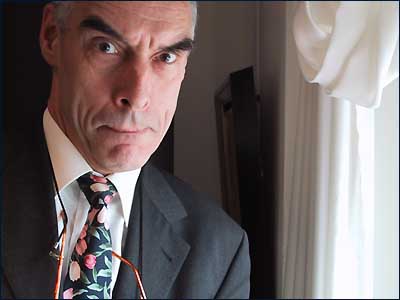| Compressed Air |

|
There are some things which make me assume a somewhat furtive look. This
means that I'm not sure whether or not I should address the issue. It's not
so much the veracity which is the criterion as it is the question whether
I'll manage with a couple of sentences to give the reader the feeling that
he or she knows what I'm talking about - always a crucial rule whenever you
find yourself taking a stand, for it's not until others think you're right
that being right actually works.
Let's assume for the sake of the argument that we were to set aside as petty jealousy the attitude of dismissal which characterised the world of art (including the press) where it concerned detailed and smooth painting in the period between 1975 and 2000, give or take the odd year (an attitude which I would suggest must have managed to reach artistic consumer circles, otherwise they wouldn't have spent the last couple of years arguing that detailed and smooth painting is once more perfectly acceptable). This would have a most liberating effect on the relentless drive to prove the opposite which used to torment my soul. The funny thing is all of a sudden the opposite seems closely associated with this phenomenon, in that people who can do something you can't are your heroes - unless you claim this role without having the necessary capabilities under your belt. That would be a gloves off scenario: should you insist that it is okay or even better than what you cannot do, or should you bow to the talented enthusiast who him or herself wouldn't dream of insisting on privileged status? Let's assume for the sake of the argument that statistical surveys had borne out that the intelligence of people wielding the impressionist touch is lower than those opting for the detailed touch. That would be a shocking discovery, although I am quite dreadfully concerned about the Úlan with which the near-opposite of this nonsensical proposition has been catching on lately. Let's also assume for the sake of the argument that there would be a way of expressing in numbers that the positive influence of the visual arts on human morality cannot be ascertained - something which in itself would not necessarily have any meaning as it could very well be that the positive forces cancelled out their negative counterparts, something which would not only be praiseworthy in its own right but would also demonstrate as such that at least part of the visual arts has a beneficial effect -, this would not as such be a reason to start bickering about who should be allowed to claim these blessings for themselves. My counter-argument against all of this is doubtful: I invariably suggest that the true state of play might come to light 50 or 100 years from now. But let's assume that everyone would be sensible enough to concur with these insights, so that no-one would have the pleasure, rightly or wrongly, of seeing him or herself proven right - surely one could argue in such a scenario that it would by definition be better if a select group of people were to be able to relish this pleasure than if no-one qualified at all. And I wouldn't mind if they belonged to the official world of art either. It's amazing how good such generosity can make you feel. |